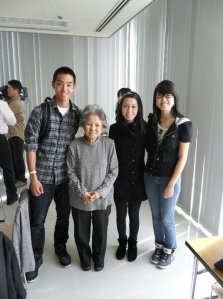
—
Today’s post is by Nic Cable, a senior at Depaul, pursuing a double major in Religious Studies and Peac, Justice, and Conflict Studies. He is serving his second year as an Interfaith Scholar at DePaul University and is the Director of the Better Together Campaign at this institution.
—
The room was tense as we waited for the moment everyone felt differently about. Some of us were apprehensive, some slightly fearful. Others were intrigued and some still were a little excited. Ms. Sasamori entered the room at a slow, yet steady pace. Her face, I noticed immediately, was scarred from something long ago. Her stature no more than five feet tall. A smile never left her face as she entered bowing before us and saying in a louder voice than I had imagined: “Good Morning!”
This salutation set the tone of her two hour long talk with us about her experiences before, during, and after surviving the dropping of the Atomic Bomb in Hiroshima, Japan. Twenty young students, sat silently glued to every word, story, and emotion that fell from the mouth of this elderly survivor nearing her eighties. I thought about the emotions that were stirring in the hearts of my fellow students.
As Ms. Sasamori shared tragic stories that happened to her and to those she cares most about, I began to realize how resilient this woman truly was. She survived the worst single attack in the history of the world and today tells her story to people all over the world. The most striking thing about her stories are not the graphic or gory parts of it, but the underlying presence of compassion and love woven throughout. Of all the people I have met in this world, Ms. Sasamori has been the most compassionate and loving. Her black eyes and arthritic hands, her little laugh and her cute smile, everything about her felt uncharacteristically compassionate.
It is uncharacteristic because oftentimes when we are hurt in such a tragic way, we respond maybe not always physically, but at least mentally with some form of anger, hatred, or desire for revenge. Ms. Sasamori had none of this in her heart. I asked her if there was ever a time when there was such anger. She replied with a simple no. She explained that when you experience something like the Atomic Bomb everything changes.
I realized that this was true as I noticed how she was interacting with people in the room. When faced with the Atomic bomb your worldview changes. What’s most important changes. Most importantly, the boundaries change. These boundaries regard the definition of who my brother and my sister are. The bomb destroys these boundaries and all that is left are fragile pieces of the world. Ms. Sasamori is putting these pieces back together. She has done so for decades in countless talks around the world, trying to inspire others to come together to heal the world.
But, she is not alone. Millions of people throughout the world work tirelessly to heal humanity everyday from countless explosions from the international to the interpersonal levels. At DePaul University, we work to reach out with our hearts and spirits through our hands and words everyday with service and action. We promote the power of respectful dialogue to remind students of different religious and social backgrounds that we are similar in many ways.
Ms. Sasamori has awakened me to something so beautiful about the world: even out of the gravest situation, where death is almost all that remains, a single seed of hope, love, and compassion can emerge and bloom in full force. As Steve Leeper, the chairman of the Hiroshima Peace Culture Foundation, reminds us, “there are two cultures out there at odds: a culture of war and a culture of peace.” We are all working on the side of love and peace. May this be our journey together in the New Year.